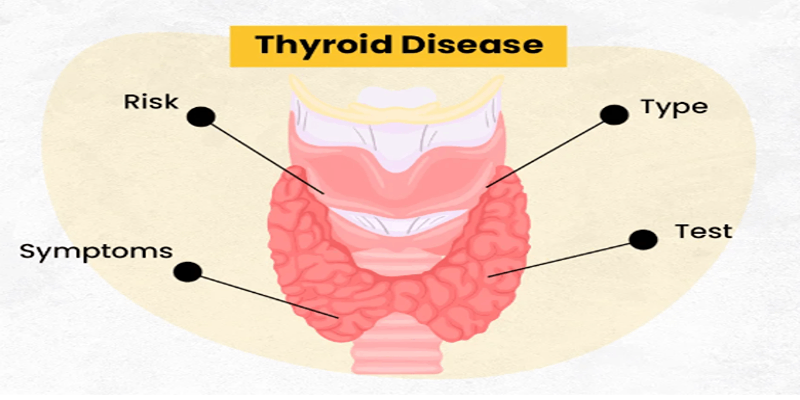
Thyroid Disorder
Thyroid disorders refer to a group of conditions that affect the thyroid gland, a small, butterfly-shaped gland located at the front of the neck. The thyroid gland plays a crucial role in regulating the body's metabolism by producing hormones that control how the body uses energy. When the thyroid gland produces too much or too little of these hormones, it can lead to various health problems.
Types of Thyroid Disorders
-
Hypothyroidism (Underactive Thyroid)
- Description: Hypothyroidism occurs when the thyroid gland does not produce enough thyroid hormones (thyroxine, T4, and triiodothyronine, T3). This slows down the body's metabolism.
- Causes: The most common cause is Hashimoto's thyroiditis, an autoimmune disorder where the body's immune system attacks the thyroid gland. Other causes include iodine deficiency, certain medications, and radiation therapy.
-
Symptoms:
- Fatigue and weakness
- Weight gain
- Cold intolerance
- Dry skin and hair
- Constipation
- Depression
- Slow heart rate
- Memory problems and difficulty concentrating
- Treatment: Typically involves hormone replacement therapy with synthetic thyroid hormone (levothyroxine) to normalize hormone levels.
-
Hyperthyroidism (Overactive Thyroid)
- Description: Hyperthyroidism occurs when the thyroid gland produces too much thyroid hormone, leading to an accelerated metabolism.
- Causes: The most common cause is Graves' disease, an autoimmune disorder where the immune system overstimulates the thyroid. Other causes include thyroid nodules, thyroiditis, and excessive iodine intake.
-
Symptoms:
- Unintentional weight loss
- Rapid or irregular heartbeat (palpitations)
- Nervousness, anxiety, and irritability
- Tremors in the hands or fingers
- Increased sweating
- Heat intolerance
- Increased appetite
- Frequent bowel movements
- Fatigue and muscle weakness
- Treatment: May include anti-thyroid medications, radioactive iodine therapy, or surgery to remove part or all of the thyroid gland.
-
Goiter
- Description: Goiter refers to an abnormal enlargement of the thyroid gland. It can occur in both hypothyroidism and hyperthyroidism, or in cases where the thyroid function is normal (euthyroid goiter).
- Causes: Iodine deficiency is the most common cause of goiter worldwide. Other causes include Graves' disease, Hashimoto's thyroiditis, and thyroid nodules.
- Symptoms: The primary symptom is a visible swelling at the base of the neck. Large goiters may cause difficulty breathing or swallowing.
- Treatment: Treatment depends on the underlying cause and may include iodine supplements, thyroid hormone therapy, or surgery if the goiter is large or causing symptoms.
-
Thyroid Nodules
- Description: Thyroid nodules are lumps or abnormal growths within the thyroid gland. They can be solid or filled with fluid and are usually benign (non-cancerous), but in some cases, they may be cancerous.
- Causes: The exact cause of thyroid nodules is often unknown. Risk factors include iodine deficiency, family history, and radiation exposure.
- Symptoms: Most thyroid nodules do not cause symptoms. However, if they are large, they may cause a visible lump in the neck, difficulty swallowing, or breathing issues. Some nodules may produce excess thyroid hormone, leading to hyperthyroidism.
- Treatment: Depends on the nature of the nodule. Benign nodules may require no treatment but regular monitoring. Suspicious or cancerous nodules may require surgery, radioactive iodine therapy, or thyroid hormone suppression therapy.
-
Thyroid Cancer
- Description: Thyroid cancer is a type of cancer that starts in the thyroid gland. It is generally less common than other thyroid disorders but can be serious.
- Causes: The exact cause is unknown, but risk factors include radiation exposure, family history of thyroid cancer, and certain genetic conditions.
- Symptoms: Symptoms may include a lump in the neck, changes in voice, difficulty swallowing, and swollen lymph nodes.
- Treatment: Common treatments include surgery to remove part or all of the thyroid gland, radioactive iodine therapy, external beam radiation, and chemotherapy in advanced cases.
Diagnosis of Thyroid Disorders
Thyroid disorders are typically diagnosed through a combination of:
- Blood Tests: Measure levels of thyroid hormones (T3 and T4), Thyroid-Stimulating Hormone (TSH), and sometimes thyroid antibodies to assess thyroid function.
- Imaging Tests: Ultrasound, radioactive iodine scans, and sometimes CT or MRI scans to visualize the thyroid gland and detect nodules or other abnormalities.
- Biopsy: Fine-needle aspiration biopsy is used to evaluate thyroid nodules for cancer

